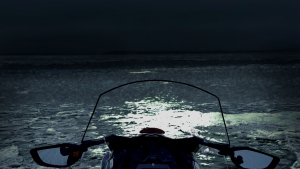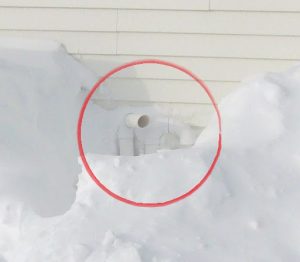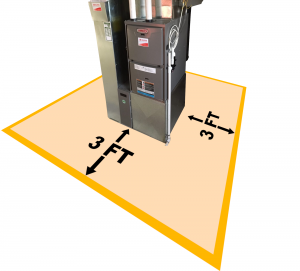Happy New Year! On this page you can find some Fire Safety and Prevention tips for the month of January. Although it is a new year, the season is much the same as last month. As such, many of the Fire Safety tips from December are still very applicable during this month. Here are some tips to keep Fire and Winter Safety on your mind! Don’t forget to keep any entry/exits in your home or business cleared from snow. This can ensure you and your guests or customers can get out in case of a fire or any other emergency!
Basic Ice Water Safety
- Check the ice thickness before venturing out on foot or snow machine
- Wear a lifejacket and or buoyant thermal protection suit as it will help keep you above water if you break through and help slow the effects of the extremely cold water.
- Do not venture out onto unfamiliar lakes, rivers, ponds, or any iced over water. Do your research, ask around and gather information on the body of water and any known issues or hidden dangers.
- Avoid travelling across ice at night. Areas that have become thin or melted could be hard to see until it is too late.
- Never go alone! Always travel in groups and ensure friends / family know you are going out, where you are going to, and an expected time to reach your destination or return.
Christmas Tree Disposal
- Ensure any Christmas trees that are no longer wanted are disposed of properly according to local by-laws and regulations. Do not leave real trees up and decorated for an extended period as they will have dried out over the holidays and pose a real fire hazard to your home.
- Do not dispose of your tree by burning it in the fireplace or wood stove. The rapid burning and excessive heat can damage the firebox and chimney creating a serious fire hazard. If you are going to burn, ensure you do so properly, in a fire pit located away from your house and any other structures. If you are a resident of the Town of Bancroft, you can also dispose of your live tree at the Municipal Waste Site. Please contact the Municipal Waste Site for regulations and any tipping fees that may apply.
Fireplaces
- Have any chimneys cleaned and inspected prior to using fireplaces for the first time in a season, and periodically throughout.
- When cleaning a wood fireplace, place all embers and ash in a metal container with a lid and take them outside to store or dispose of. Do not place them in any type of container that is not fire-resistant, such as a plastic or paper bag. Do not dispose of them indoors, close to your home or close to any other structure such as a garage or shed.
- Clean the ashes out regularly to sure the fire box does not become overloaded.
- Do not dispose of any wrapping papers or gift boxes in a fireplace. Wrapping paper and cardboard gift boxes can ignite quickly and burn intensely which could lead to severe burns or an out of control fire in your home.
- Do not hang any Christmas stockings or decorations from the mantel if/when the fireplace is in use.
- Always use an ember screen in front of any open fireplaces to protect against flying sparks.
- Never use any flammable liquids or aerosols such as gasoline or brake cleaner to start a fire.
- Use only thoroughly dried wood. Do not use your Christmas tree for firewood.
- Never leave the fire unattended or let it smolder.
- Clean the ashes regularly. Place the ashes in a metal container and store outside away from flammable materials.
Exterior Vents
- Weather fluctuations and heavy snow events can lead to exterior vents for gas fired appliances getting covered, blocked or buried. This can lead to a rapid build up of Carbon Monoxide in your home.
- Ensure all exhaust vents for any gas fired appliances (stoves, furnace, boilers, range-hoods, etc.) are free and clear of any ice or snow build up
- If you notice any damage to your exhaust or fresh air vents or louvres, have them inspected by a certified technician and replaced.
Candles
- Never leave candles unattended. Ensure you extinguish any lit candles when leaving the room or going to sleep.
- Place candles in burn-resistant containers that won’t tip over. These containers should be big enough to collect any wax drippings. Keep lit candles away from items that can catch fire
- Don’t place lit candles near windows with blinds or curtains.
- Keep candles up and away from children and pets. Never leave children or pets unsupervised near lit candles. Avoid placing candles in high traffic areas where they could easily be knocked over.
- Never let candles burn completely to the bottom. Extinguish and dispose of them when they get within 4 cm of the base. This includes standard candle sticks as well as jar candles
- Do not allow children of any age to light candles in their bedrooms.
- Be careful when using candles for light during power outages, exercise caution when using candles as a light source. Instead, try using LED lights or flashlights to avoid potential fire risks
- Never use lit candles for light when refueling equipment such as a generator, camp fuel heater or lantern.
- Keep candle wicks short when not in use, trim if necessary to approx. 1/4 inch.
- Use extreme caution when carrying a lit candle, holding it well away from you, your clothes and any other combustible objects near you.
Heating
- Keep a clear space of at least 3 feet (1 meter) around any heating equipment, like a furnace, fireplace, wood stove, or portable space heater. Use the same rule to keep children at distance from heat sources as well.
- Never use an oven or barbeque to heat your home. Not only does this present a huge fire risk, but the carbon monoxide emissions from a left open oven or barbeque build up quickly and are deadly.
- Have heating equipment, chimneys and furnace/boiler vents cleaned and inspected every year by a qualified professional.
- Never leave portable heaters running unattended. Turn them off when leaving the room or going to bed.
- Follow manufacturer instructions for correct operations of any space heaters. Only use fuel specified by manufacturers for any fuel burning space heaters.
- Be sure all furnace controls and emergency fuel and electrical breaker shutoffs are in proper working condition.
- Inspect the walls and ceiling near the furnace and along the chimney line. If the wall is hot or discoloured, additional pipe insulation or clearance may be required.
- Check your chimney flue pipe and pipe seams. Ensure they are well supported, free of holes, cracks and any damage. If any damage is noticed, have those sections replace immediately. Do not use any fireplaces with damaged chimneys, brick or metal. Soot around pipe seams may be an indicator of a leak.
- All unused flue openings should be sealed properly.


